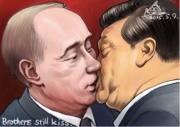|
Why would Venezuela have been cutting crude sales to India (Reliance) since 2017, in order to make oil-for-loans payments to Sinopec and Rosneft, if a loss of demand from US refineries were the problem, rather than a loss of supply? India refines raw Venezuelan crude.
|
|
|
|

|
| # ? May 27, 2024 00:14 |
|
Warbadger posted:In took decades of growth to get to the point of being a net exporter. Venezuelan production of cheap oil dropping like a rock as the extraction and transportation infrastructure fell apart in Venezuela has driven oil prices up globally and made US oil production more competitive and profitable. Venezuelan fields ramping production back up will hurt the less profitable US oil interests in the same way the KSA ramping up production - do you understand that? I posted the sanctions in this thread. On the last page. Venezuela can't expand production without the transactions and financing which are blocked by the sanctions, nor should they necessarily want to. Venezuela also needs to think of strategically maintaining their oil reserves, and doesn't need to overproduce for geopolitical reasons like Saudi Arabia did. ronya posted:Why would Venezuela have been cutting crude sales to India (Reliance) since 2017, in order to make oil-for-loans payments to Sinopec and Rosneft, if a loss of demand from US refineries were the problem, rather than a loss of supply? India refines raw Venezuelan crude. There isn't a loss of demand because CITGO was exempted from sanctions. The loss of supply stems from sanctions placed on Venezuelan Petroleum.
|
|
|
|
fnox posted:Did you read that in the most unbiased source of Venezuelan news, Venezuelanalysis dot com? No? Or are you going to tell me his signature here was forged: https://static.telesurtv.net/filesOnRFS/opinion/2015/12/09/mud_government_plan.pdf
|
|
|
|
https://www.miamiherald.com/latest-news/article225123050.html The Venezuelan military attache in DC has flipped on Maduro. I think this is the highest ranked military officer to do so. Y'all should try adding all the tankies to ignore; they discount any information that doesn't support their position so common ground is impossible anyway.
|
|
|
|
Warbadger posted:Then you should understand how stupid the thing you said is. Why, in your mind, would US oil companies want to control Venezuela's oil reserves and how would they accomplish this here in reality? Keep in mind a large chunk of the Venezuelan state's oil interests have already been sold to Russian and Chinese companies and US oil companies already make a buck off refining the oil. Both geopolitical and financial. They would love to have Venezuela stop selling to Cuba. The whole point of this is to destroy any hope of the socialist projects succeed. The nationalization of the Venezuelan oil industry is the biggest threat to American ‘interest’. The financial interests of privatization are obvious for foreign investors. And if it isn’t oil, then why do you think the US is coordinating this coup?
|
|
|
|
The source of the graph does offer an explanation for the discrepancy:quote:[3] There are a number of different data series for Venezuelan oil production, and they differ with respect to the timing of the start of the decline. In Chart 2, we use OPEC’s data from independent secondary sources, which presents a stable trend until 2016. This is the series that OPEC uses, for example, to set production quotas. Data reported by the government to OPEC, as well as data from IPD Latin America, time the start of the decline earlier. Nevertheless, both of them show an acceleration of the decline at the start of 2016. They are thus consistent with our thesis that factors leading to a decline of oil output made themselves felt at the start of 2016. (worth noting, in case you are as curious as to WOLA's positioning as I was, that it has issued a statement on current events) The "nevertheless" argument seems odd, though. The thing is: if one says, "actually it's about financing", then the problem with that argument is that the United States does not have a monopoly on oil industry credit. Sovereign debt, sure, the Venezuelan government opts to issue its bonds in the NY sovereign debt market everyone else uses, but oil? The Venezuelan oil company PVDSA is already neck deep in loans to Russia and Chinese oil buyers; it could obtain more loans... if it weren't already late in payments in oil to those creditors. If one says "actually it's about access to refineries" then why cut sales to India? The narrative is at variance to what one has been seeing in the financial news for two years
|
|
|
|
Dreylad posted:No? Or are you going to tell me his signature here was forged: Lmao you guys are a blast. Are you really only reading Telesur and Venezuelanalysis? Regardless, you linked me to a 175 page document that is actually from the opposition primaries in 2013. Not exactly sure on what damning evidence this is of wrongdoing.
|
|
|
|
Presenting Nipples posted:The nationalization of the Venezuelan oil industry is the biggest threat to American ‘interest’. The nationalization occurred in 1976 and even reached the point that PDVSA bought out American company Citgo over the course of the 80s and early 90s. If it's such a big threat, why didn't it get knocked over back then?
|
|
|
|
ronya posted:The source of the graph does offer an explanation for the discrepancy: The specific question about refineries was why Venezuela doesn't simply refuse to sell to the United States. Saying "the United States does not have a monopoly on oil industry credit" also ignores that the United States can target foreign businesses for reprisals when they ignore US sanctions. The United States can also pressure its allies in other centers of global finance to observe their sanctions regime with the threat of targeted retaliations. This has been the consistent modus operandi of the Trump administration.
|
|
|
|
fnox posted:Lmao you guys are a blast. Are you really only reading Telesur and Venezuelanalysis? It's uh, what's in the document, the policy proposals that would privatize as much of Veneuzeula as possible, even changing educational curriculum to teach children “the connection between property, economic progress, political liberty and social development” (proposal 612). Is a primary document that has the signature of Lopez on it an unacceptable source because of who is hosting said document? Has it been forged or tampered with? Because if that's the case I think this thread has become an ouroboros of people no longer able to discern any opposing view as anything but tankie bad thoughts.
|
|
|
|
Remember when Chavez let Exxon Mobil have refineries in Venezuela back in ‘01? I guess Chavez was a stooge all along
|
|
|
|
fishmech posted:The nationalization occurred in 1976 and even reached the point that PDVSA bought out American company Citgo over the course of the 80s and early 90s. The profits weren’t used for the poor in the 80s and 90s. I should have said ‘nationalized the profits’ to be more explicit.
|
|
|
|
Furia posted:Remember when Chavez let Exxon Mobil have refineries in Venezuela back in ‘01? That was a year before the United States supported the '02 coup. Nonetheless, third world countries whose GDPs depend on primary resources cannot simply pick and choose which countries they can refuse to sell to, especially when the country in question is its biggest and most profitable customer. If Cuba had not had a blockade imposed on it, it's certain that the Castro regime would have done business with the United States. It's not an act of betrayal to seek vital revenues, and it's naive to assume that there's some sort of ideological consistency that trumps material realities.
|
|
|
|
Presenting Nipples posted:The profits weren’t used for the poor in the 80s and 90s. I should have said ‘nationalized the profits’ to be more explicit. The profits were in fact used for the government in the 80s and 90s. Just admit you thought the nationalization only happened in the 2000s and was something new from Chavez rather than fail to come up with a valid argument for why the US would love nationalization before Chavez.
|
|
|
|
Dreylad posted:It's uh, what's in the document, the policy proposals that would privatize as much of Veneuzeula as possible, even changing educational curriculum to teach children “the connection between property, economic progress, political liberty and social development” (proposal 612). Is a primary document that has the signature of Lopez on it an unacceptable source because of who is hosting said document? Has it been forged or tampered with? Because if that's the case I think this thread has become an ouroboros of people no longer able to discern any opposing view as anything but tankie bad thoughts. No, it's just funny that the document is available from the MUD itself yet you found it while reading Telesur. I would say Telesur, a network specifically created by Chavez and funded by the Venezuelan government; and Venezuelanalysis, a website that openly states it's a supporter of the Bolivarian Revolution and has received funding from the Ministry of Culture, are quite biased sources. Regardless, "Incorporar en el sistema educativo básico y medio, temas demostrativos sobre la conexión entre propiedad, progreso económico, libertad política y desarrollo social" is a super tame sentence, I'm not sure if it just sounds stronger when translated but it doesn't even say "private property" specifically, and the other stuff like, economic progress, political freedom and social development sounds pretty alright.
|
|
|
|
Dreylad posted:It's uh, what's in the document, the policy proposals that would privatize as much of Veneuzeula as possible, even changing educational curriculum to teach children “the connection between property, economic progress, political liberty and social development” (proposal 612). Is a primary document that has the signature of Lopez on it an unacceptable source because of who is hosting said document? Has it been forged or tampered with? Because if that's the case I think this thread has become an ouroboros of people no longer able to discern any opposing view as anything but tankie bad thoughts. In the same vein, during Guaido’s speech he started attacking food distribution programs and public housing. Pretty clear proof that the only supporters of the coup are expats, bondholders, and the wealthy.
|
|
|
|
It's more credible to assume that the antagonism between the United States and Venezuela, stems from Chavez's attempts to form solidarity organizations between Latin American countries with the intent of leading South America into independence from first world institutions of finance. This was a credible threat to American hegemony, with the backing of nationalized oil & gold.
|
|
|
|
fishmech posted:The profits were in fact used for the government in the 80s and 90s. Just admit you thought the nationalization only happened in the 2000s and was something new from Chavez rather than fail to come up with a valid argument for why the US would love nationalization before Chavez. Government and poor are two different things.
|
|
|
|
fnox posted:No, it's just funny that the document is available from the MUD itself yet you found it while reading Telesur. I would say Telesur, a network specifically created by Chavez and funded by the Venezuelan government; and Venezuelanalysis, a website that openly states it's a supporter of the Bolivarian Revolution and has received funding from the Ministry of Culture, are quite biased sources. Telesur was created by a multitude of Latin American governments, and is also funded by countries other than Venezuela such as Bolivia and Uruguay. It's a naive assumption that people need to have unbiased sources when unbiased journalism doesn't exist. Regardless of the biases of Telesur, what's being presented is a primary document outlining Popular Will's platform in 2013, as laid out by Leopoldo Lopez.
|
|
|
|
Pener Kropoopkin posted:That was a year before the United States supported the '02 coup. And let them stay until ‘06 why exactly?
|
|
|
|
Pener Kropoopkin posted:The specific question about refineries was why Venezuela doesn't simply refuse to sell to the United States. Saying "the United States does not have a monopoly on oil industry credit" also ignores that the United States can target foreign businesses for reprisals when they ignore US sanctions. The United States can also pressure its allies in other centers of global finance to observe their sanctions regime with the threat of targeted retaliations. This has been the consistent modus operandi of the Trump administration. does CNPC give that much of a drat what the State Department thinks of its credit policy? Or in what world does Reliance care? Both India and China are so big that power flows in the reverse direction: they can demand, and receive, waivers from American enforcement of the sanctions through the American financial system, because both of those countries can readily arrange their financing and settlements elsewhere and the US knows it Maybe Rosneft, sure, but that would be for other Trump-specific reasons  e: word ronya fucked around with this message at 18:25 on Jan 27, 2019 |
|
|
|
fnox posted:No, it's just funny that the document is available from the MUD itself yet you found it while reading Telesur. I would say Telesur, a network specifically created by Chavez and funded by the Venezuelan government; and Venezuelanalysis, a website that openly states it's a supporter of the Bolivarian Revolution and has received funding from the Ministry of Culture, are quite biased sources. I didn't find it "reading Telesur" I found it when I googled the document and it popped up before the MUD link. Looking at my reading list and browser history that appears to be the first time I've accessed Telesur, at least as far as I know. This is getting hilariously conspiratorial.
|
|
|
|
Pener Kropoopkin posted:Telesur was created by a multitude of Latin American governments, and is also funded by countries other than Venezuela such as Bolivia and Uruguay. It's a naive assumption that people need to have unbiased sources when unbiased journalism doesn't exist. Regardless of the biases of Telesur, what's being presented is a primary document outlining Popular Will's platform in 2013, as laid out by Leopoldo Lopez. Yes, that is why I'm saying it's a biased source. Usually you can tell it's a biased source because the other sources are not saying the same thing. To describe Venezuelanalysis as an unbiased source is beyond insane. Telesur is primarily funded by the Venezuelan government, and headquartered in Caracas, it is the channel that the Venezuelan government uses internationally. That doesn't outline Voluntad Popular's plan, that's the MUD's plan. Leopoldo Lopez signed it, as did the other candidates of the primaries like Henrique Capriles, Maria Corina Machado and Pablo Perez. I'm still not sure how any text in it makes Leopoldo Lopez look like a maniac. Dreylad posted:I didn't find it "reading Telesur" I found it when I googled the document and it popped up before the MUD link. Looking at my reading list and browser history that appears to be the first time I've accessed Telesur, at least as far as I know. What did you Google? "leopold lopez bad"?
|
|
|
|
There are no unbiased sources.
|
|
|
|
Dreylad posted:There are no unbiased sources. uninterrupted posted:Venezuelanalysis (one of the few unbiased sources of Venezuelan news)
|
|
|
|
And I disagree? If you're seriously lumping posters together based on your presumption that they must agree on everything this thread should probably just be gassed.
|
|
|
|
Dreylad posted:And I disagree? If you're seriously lumping posters together based on your presumption that they must agree on everything this thread should probably just be gassed. Glad you disagree. What's the part that makes Leopoldo Lopez specifically a maniac again?
|
|
|
|
uninterrupted posted:None of the things above happened, it’s completely illegal. Tell me what institution oversees CLAP
|
|
|
|
Pener Kropoopkin posted:Telesur was created by a multitude of Latin American governments, and is also funded by countries other than Venezuela such as Bolivia and Uruguay. It's a naive assumption that people need to have unbiased sources when unbiased journalism doesn't exist. Regardless of the biases of Telesur, what's being presented is a primary document outlining Popular Will's platform in 2013, as laid out by Leopoldo Lopez. Pener ive realized something you support communism because the only way your fat crack is gonna get a wife is if the state issues you one (USER WAS PUT ON PROBATION FOR THIS POST)
|
|
|
|
ronya posted:does CNPC give that much of a drat what the State Department thinks of its credit policy? Or in what world does Reliance care? Both India and China are so big that power flows in the reverse direction: they can demand, and receive, waivers from American enforcement of the sanctions through the American financial system, because both of those countries can readily arrange their financing and settlements elsewhere and the US knows it The United States basically pressured Canada into arresting Meng Wenzhou to extradite her, for allegations that she violated American sanctions against Iran. Sanctions which Canada does not even observe. Yet we're supposed to assume that India, an American ally, will somehow act unilaterally to bail out Venezuelan Petroleum? Or that China would also risk reprisals from the United States to do the same? The Trump administration has thrown its economic weight around the world, with no regard for the consequences and they're not about to stop now. China and India cannot simply operate independent of the Western finance regime. They don't have the infrastructure to do so.
|
|
|
|
Today is a kind of Amnesty Law Awareness Day, and Venezuelans are being asked to print out cheat sheets of the law and to give them out to soldiers. The point of the exercise is to spread awareness about the law, and to cut through whatever communication barriers the army may be mounting between its soldiers and civil society. The amnesty law was passed on January 15 and it mainly does two things: it wipes the slate clean on all political persecutions conducted from January 1 1999 to today, and it grants amnesty to all civil and military officials who "contribute" to restoring democracy in the country. The law also guarantees that any official who does this will be able to take up their life in the post-dictatorship Venezuela (i.e., that they won't be banned from their jobs). What's really important to note here is that these calls for civil/military officials to to turn on the regime are grounded on two constitutional articles that the law cites: 333 and 350. These two articles spell out that 1) The Constitution is in effect even if a dictatorship comes along and just ignores it and tramples it, 2) every citizen has the "duty to collaborate" in the restoration of constitutional order if 1) occurs, and 3) that Venezuelans have to "disown" dictatorial governments. It's really important to keep this in mind because it totally undermines the argument that some observers are making that the opposition is trying to launch a coup d'etat, which are by definition illegal power grabs. On the contrary: these open calls for the army and civil servants to abandon the regime are based entirely on provisions set out in the constitution. If we start to see soldiers and civil servants abandoning Maduro it will the result of a constitution that is working as intended. The word "contribute" is important. The law explicitly states that to "contribute" to the restoration of democracy is outlined in articles 333 and 350 of the constitution. Below, the two articles: quote:Article 333: This Constitution will not cease to be in effect if it ceases to be observed due to an act of force or because it is repealed in any way other than what is outlined in this document. Here's a shortened version of the amnesty law. I think this is the sheet that people are giving soldiers today: https://twitter.com/delsasolorzano/status/1089545898663821313 quote:[Title: What's the Amnesty Law?] Here's a video of a National Guard officer telling demonstrators in Caracas today that he and his men are loyal to Maduro, but that he is nevertheless going to accept the copy of the amnesty law. It sounds like the officer just wanted the demonstrators to leave: https://twitter.com/mcobelaVV/status/1089539571484897285 This exchange was less cordial. Protesters are chanting "soldiers, we're waiting for you!" while a National Guardsman burns the copy of the amnesty law that he has been given: https://twitter.com/rachellekrygier/status/1089560011007774720
|
|
|
|
Pener Kropoopkin posted:I posted the sanctions in this thread. On the last page. Venezuela can't expand production without the transactions and financing which are blocked by the sanctions, nor should they necessarily want to. Venezuela also needs to think of strategically maintaining their oil reserves, and doesn't need to overproduce for geopolitical reasons like Saudi Arabia did. Then I guess it should be even easier for you to post that information! Which sanctions, specifically, are impacting Venezuelan oil exports? How is Venezuela overproduction entering into this argument? Are you suggesting the plummeting Venezuelan production is a case of Venezuela conserving oil reserves? Pener Kropoopkin posted:The United States basically pressured Canada into arresting Meng Wenzhou to extradite her, for allegations that she violated American sanctions against Iran. Sanctions which Canada does not even observe. Canada definitely observed the sanctions back when Meng Wenzhou committed fraud to bypass them. So did most Chinese companies, coincidentally, which is why fraud and a shell company to move US tech into Iran around sanctions was necessary. Do you actually know anything about anything you're posting about? Warbadger fucked around with this message at 18:59 on Jan 27, 2019 |
|
|
|
Warbadger posted:Then I guess it should be even easier for you to post that information! Which sanctions, specifically, are impacting Venezuelan oil exports? I can see now that you're playing some kind of semantics game where sanctions that target the Venezuelan state oil company aren't explicit sanctions which target exports, even though starving the company of finances and transactions would reduce its production capacity and therefore all exports that would come from it.
|
|
|
|
This is a really fun The United States thread, where the suffering and testimony of Venezuelans and the ample evidence of the horrors and illegitimacy of the current Venezuelan government are cast aside by extremely online people in secure and affluent nations, to continue the glorious fight against any imperialism The United States might be doing at any given time, so that countries like China and Russia can expand their power base through political manipulation and economic and military intervention and consolidation of other countries as assets. Take that, imperialism!
|
|
|
|
Pener Kropoopkin posted:I can see now that you're playing some kind of semantics game where sanctions that target the Venezuelan state oil company aren't explicit sanctions which target exports, even though starving the company of finances and transactions would reduce its production capacity and therefore all exports that would come from it. No, I am asking you to post information on specific sanctions that impact Venezuelan oil exports to back up your statement - a thing I already knew you would be incapable of doing because it's been clear throughout the conversation that you are speaking from a position of ignorance.
|
|
|
|
Kavros posted:This is a really fun The United States thread, where the suffering and testimony of Venezuelans and the ample evidence of the horrors and illegitimacy of the current Venezuelan government are cast aside by extremely online people in secure and affluent nations, to continue the glorious fight against any imperialism The United States might be doing at any given time, so that countries like China and Russia can expand their power base through political manipulation and economic and military intervention and consolidation of other countries as assets. Take that, imperialism! China and Russia would not be able to expand their power base if the United States was not engaging in illegal regime change policies, which give embattled countries a reason to fall into their orbit. I would expect the posters in this thread who have observed legalistic coups in both Honduras & Brazil, to also be able to draw parallels to what's happening in Venezuela. Whatever legalistic arguments are presented in favor of this coup, are highly specious.
|
|
|
|
I think that geopolitical analysis goes wrong at "India, an American ally" and gets stranger from there. I think Reliance would buy Venezuelan crude if Venezuela were producing enough; I think Sinopec would take Venezuelan crude in payment if Venezuela were producing enough. I definitely think the latter would lend to Venezuela if it reckoned it credit-worthy since, in fact, this is what it has done heavily, even past 2017; it has continued inking new joint ventures where it puts up the capital and Venezuela puts up more future oil. There is something to be said about the likelihood of Chinese policy of lending to dubious projects coming to haunt them eventually, but that haunting is some way off and is any case not apropos to the point I have an unrepentantly concrete view of how "finance regimes" make themselves felt. For sovereign debt, yes, the dominant jurisdiction is American (specifically New York) so US foreign policy can make itself felt there. For something like corporate credit, though? Or payments? What specific financial services provided in the West are these countries supposedly reliant on?
|
|
|
|
Warbadger posted:No, I am asking you to post information on specific sanctions that impact Venezuelan oil exports - a thing I already knew you would be incapable of doing because it's been clear throughout the conversation that you are speaking from a position of ignorance. I posted an article citing the sanctions a couple pages ago, but I will humor you and link to an article from another source. https://www.nytimes.com/2017/08/25/world/americas/venezuela-sanctions-maduro-trump.html quote:The Trump administration imposed new economic sanctions on Venezuela on Friday, modestly ratcheting up the pressure on the embattled government of President Nicolás Maduro for increasingly repressive policies.
|
|
|
|
Kavros posted:This is a really fun The United States thread, where the suffering and testimony of Venezuelans and the ample evidence of the horrors and illegitimacy of the current Venezuelan government are cast aside by extremely online people in secure and affluent nations, to continue the glorious fight against any imperialism The United States might be doing at any given time, so that countries like China and Russia can expand their power base through political manipulation and economic and military intervention and consolidation of other countries as assets. Take that, imperialism! Hm yes those videos of wealthy pasty white venezuelans telling the military to mutiny will surely turn us around on Guaido's policy platform of less public housing, less feeding the hungry, and basically doing whatever the US says.
|
|
|
|

|
| # ? May 27, 2024 00:14 |
|
ronya posted:I think that geopolitical analysis goes wrong at "India, an American ally" and gets stranger from there. I think Reliance would buy Venezuelan crude if Venezuela were producing enough; I think Sinopec would take Venezuelan crude in payment if Venezuela were producing enough. I definitely think the latter would lend to Venezuela if it reckoned it credit-worthy since, in fact, this is what it has done heavily, even past 2017; it has continued inking new joint ventures where it puts up the capital and Venezuela puts up more future oil. There is something to be said about the likelihood of Chinese policy of lending to dubious projects coming to haunt them eventually, but that haunting is some way off and is any case not apropos to the point They're reliant on the financial services of the West to even do business with Western firms. They aren't willing to risk these relationships due to fear of retaliatory actions by the Trump administration against their own business interests.
|
|
|
















